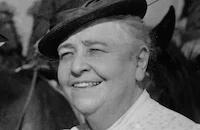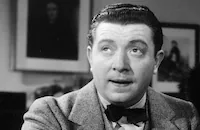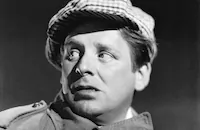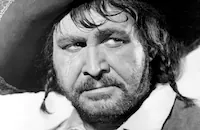All Through the Night

Brief Synopsis
Cast & Crew
Vincent Sherman
Humphrey Bogart
Conrad Veidt
Kaaren Verne
Jane Darwell
Frank Mchugh
Film Details
Technical Specs

Synopsis
Former New York City mobster Gloves Donahue, now a professional gambler, will eat only cheesecake baked by his mother's neighbor, Mr. Miller. When Miller is murdered, Gloves is urged by his mother, to whom he always listens, to investigate, and although he is reluctant at first, his interest is piqued when an attractive young woman comes looking for Miller and disappears as soon as she learns he is dead. That night, nightclub owner Marty Callahan telephones Gloves to demand that he retrieve Mrs. Donahue, who has discovered Leda Hamilton, the mysterious woman from that morning, singing at Callahan's club. When Gloves questions Leda, she provides simple explanations for each of his questions, and before long, she is dragged away by her sinister accompanist Pepi. Curious when a man runs outside and speeds away in a taxi, Gloves rushes inside just in time to see fatally wounded Joe Denning, one of Callahan's men, stagger from a dressing room. Before he dies, Denning tells Gloves that Leda has been kidnapped. Through his contacts, Gloves, who is mistakenly accused of Denning's murder, traces the taxi to a warehouse. Leaving his driver Barney behind, Gloves and Sunshine, one of his cronies, sneak inside. While Gloves looks around, Sunshine is knocked out and carried away, and when Gloves tries to find him, he is driven away by gunshots. Gloves suspects that the warehouse is connected to an exclusive auction house around the corner, where an auction is being conducted. Gloves bids on a piece in order to take a look at the offices, but once inside, he is spotted by Pepi and Leda, who knocks him unconscious. Gloves awakens in the warehouse, tied up next to the missing Sunshine. To Gloves's surprise, Leda helps free them from their bonds, and later, Gloves and Sunshine overpower their captors. Inside the auction house, the pair find evidence that the mysterious group consists of German spies and fifth columnists, as well as a notebook that indicates that Leda's father has died in Dachau. When Gloves tries to take Hall Ebbing, the leader of the spies, to the police, however, Ebbing summons the others, and Gloves barely escapes with an unconscious Leda during the ensuing gunfight. While they run from the Germans, Leda explains that Miller was forced to work for them against his will. She also reveals that she must work for them or they will kill her father, but when Gloves tells her that her father is dead, she readily agrees to help him. The police do not believe Leda's testimony, however, and Gloves is forced to call on Callahan for help in avenging Denning's death. Gloves and Sunshine infiltrate a meeting, where they learn that the Germans plan to blow up a ship docked in the Brooklyn shipyard. They keep the group distracted long enough for Callahan's men to arrive. Ebbing escapes, determined to blow up the ship by himself, and Gloves follows him. At gunpoint, Ebbing forces Gloves to drive a small boat toward the ship, but at the last minute, Gloves turns the boat sharply and knocks Ebbing overboard. Gloves is declared a hero and charges against him and Leda are dropped.

Director

Vincent Sherman
Cast

Humphrey Bogart

Conrad Veidt

Kaaren Verne

Jane Darwell

Frank Mchugh

Peter Lorre

Judith Anderson

William Demarest

Jackie C. Gleason

Phil Silvers

Wally Ford

Barton Maclane

Edward Brophy
Martin Kosleck
Jean Ames

Ludwig Stossel
Irene Seidner

James Burke
Ben Welden
Hans Schumm
Charles Cane
Frank Sully
Sam Mcdaniel
Leo White
Billy Wayne
Al Eben
Lottie Williams
Louis Arco
Wolfgang Zilzer
John Sinclair
John Stark
Bob Kimball
Charles Sherlock
Don Turner
Emory Parnell
Clancy Cooper
Gertrude Carr
Vera Lewis
Charles Wilson
Creighton Hale
Dick Elliott
Mira Mckinney
Philip Van Zandt
Hans Joby
Egon Brecher
Chester Clute
Charles Sullivan
Bob Perry
Main Bud Geary
Dutch Hendrian

Lee Phelps
Eddy Chandler
Henry Victor
Otto Reichow
Fred Vogeding
Carl Ottmar
Chester Gan

George Meeker
Roland Drew
Ray Montgomery
De Wolfe Hopper
Walter Brooke
Regina Wallace
Leah Baird
Stuart Holmes
Mary Servoss
Crew
Adolph Deutsch
Edwin A. Dupar
Rudi Fehr
Leo F. Forbstein
Oliver S. Garretson
Edwin Gilbert
Lillian Goodman
Sid Hickox
Bill Kissel
Johnny Mercer
Max Parker
Leonard Q. Ross
Arthur Schwartz
Howard Shoup
Leonard Spigelgass
Leonard Spigelgass
Jerry Wald
Perc Westmore

Photo Collections
Videos
Movie Clip



Trailer
Hosted Intro
Film Details
Technical Specs

Articles
All Through the Night
The film was budgeted at $600,000, which meant, according to director Vincent Sherman, "that it was an A film and that I was now definitely an A full-fledged A director. My salary, however, remained the same, three hundred dollars a week, while several A directors were being paid thousands a week. I was not happy about it, but I was not disgruntled. The fun and excitement of working on screenplays, directing actors, and learning about the technique of film made up for any resentment I felt for being underpaid."
Interestingly, Humphrey Bogart was not the first (or second) choice for the lead. Bogart had scored with audiences in The Maltese Falcon (1941) and High Sierra (1941), but he was not yet the star he would become later that year, when Casablanca (1942) would be released. Hal Wallis originally wanted the gossip columnist Walter Winchell to play the lead. The idea seems bizarre, but Wallis reckoned that the publicity of casting Winchell "would more than make up for any defects in Winchell's acting." In any event, Winchell couldn't take eight weeks off to make the picture, and so Wallis offered the part to George Raft. Raft turned it down and so Bogart stepped in.
On loan from MGM, the great Conrad Veidt (The Cabinet of Doctor Caligari , 1920) plays the master spy Franz Ebbing, while Judith Anderson, who had just played Mrs. Danvers in Hitchcock's Rebecca (1940), plays Madame. Anderson was making Kings Row (1941) for Wallis at the same time and so she had to scuttle between sound stages, changing back and forth from period to modern costume. Peter Lorre turns in a wonderful performance as Pepi, and William Demarest, whose comic skills had been so ably showcased by Preston Sturges, almost steals the picture with his pidgin German. The wonderful Jane Darwell, who won wide acclaim for her portrayal of Ma Joad in John Ford's The Grapes of Wrath (1940), played Bogart's mother. Leda Hamilton is played by Kaaren Verne, who played the lead in Underground and was also working simultaneously on Kings Row. Off-screen, it seems as if love brought the onscreen enemies together, as Lorre and Verne fell in love and were married soon after Lorre divorced his wife, the actress Celia Lovsky.
And speaking of Lorre, Sherman relates how the actor "had given up hope of ever doing serious and meaningful work in Hollywood." For Lorre, who had worked in Europe with Bertolt Brecht, Fritz Lang, Alfred Hitchcock and G.W. Pabst, film acting had become simply a way to earn some cash. When Sherman told Lorre he wanted to do another take of a particular scene, Lorre shot back: "That's all brother Vince. I can only do this crap once a day." "Just a minute, Peter," I replied, pretending to be angry. "Don't talk to me about crap - how did you do all those Mr. Motos at Fox?" "I took dope." Sherman thought Lorre was joking, but a later conversation with Rudi Fehr, the film's editor, who, like Lorre, was a German refugee, convinced him that Lorre had been speaking in earnest.
The cast is rounded out by two Warner brothers veterans: Barton MacLane, who appeared in seven films with Bogart, but is perhaps best remembered as General Martin Peterson in TV's I Dream of Jeannie; and Ed Brophy, the perennial cigar-chewing lunkhead, whose immortality is assured thanks to Disney's Dumbo (1941); he provides the voice of Timothy Mouse. And don't forget to watch closely for a couple of interesting cameos. According to Sherman, Jack Warner personally telephoned and directed Sherman to put two young comics in the picture. Their names? Jackie Gleason and Phil Silvers. Sherman told Warner he had no parts left, but Warner simply replied: "Well, make some parts." According to Sherman, "it occurred to me that Silvers could play a waiter, and Gleason could be another of Bogie's henchmen. I asked them to bring me in some pages and I'd try to fit them in. Gleason brought in a page of funny lines and Silvers, nine pages of jokes. Silvers can be seen briefly in the opening of the film, and Gleason now and then throughout."
The crazy scene in which Bogart and Demarest confuse the Fifth columnists with German-sounding gobbledygook, was not in the original screenplay. Sherman thought the idea up himself and presented it to producer Hal Wallis. Wallis hated the idea but Sherman was so convinced that the film needed it, that he shot it anyway. When Wallis saw the scene in the rough cut, he angrily told Sherman to take it out. Sherman, however, left a bit of it in and when the film had a sneak preview, the audience "exploded with laughter" at the double-talk. Wallis told Sherman to put it all back in.
The film also features the Johnny Mercer-Arthur Schwartz standard, "All Through the Night."
Producer: Jerry Wald
Director: Vincent Sherman
Screenplay: Edwin Gilbert, Leonard Spigelgass
Production Design: Max Parker Cinematography: Sidney Hickox
Costume Design: Howard Shoup Film Editing: Rudi Fehr
Original Music: Adolph Deutsch
Principal Cast: Humphrey Bogart (Gloves Donahue), Conrad Veidt (Franz Ebbing), Kaaren Verne (Leda Hamilton), Peter Lorre (Pepi), Judith Anderson (Madame), William Demarest (Sunshine), Jane Darwell ('Ma' Donahue), Frank McHugh (Barney), Jackie Gleason (Starchy), Phil Silvers (Louie), Wallace Ford (Spats Hunter), Barton MacLane (Marty Callahan), Edward Brophy (Joe Denning), Martin Kosleck (Steindorff).
BW-108m. Closed captioning.
by Mark Frankel

All Through the Night
Quotes
Say, chief, can't I get away just long enough to give my girl a quick hello?- Barney
No, stick around, will ya?- Alfred 'Gloves' Donahue
What are you so nervous about? She'll keep!- Starchie
That's what you think. I can't take a chance. The fleet's in and she's defense-minded!- Barney
Hello officer.- Barney
This your cab?- Cop
Yes, sir.- Barney
Better move it outta' here before somebody takes it away from ya'.- Cop
I'm waiting for a fare.- Barney
Hang around. You'll get one. Ain't a night goes by that we don't drag a stiff or two out of the river.- Cop
Say, there's more here than meets the FBI.- Alfred 'Gloves' Donahue
I start out the evening with a nice poker game in view and wind up in Central Park playing Cowboys and Indians. Now I don't know where I am. How about that! Me, in the middle of New York City, lost in the woods.- Alfred 'Gloves' Donahue
You're not afraid to die, are you?- Franz Ebbing
I don't mind dying, but I hate to be divided up into small pieces.- Alfred 'Gloves' Donahue
That friend of yours; how is he?- Barney
Fine! He's dead.- Sunshine
Trivia
Notes
A press release dated May 14, 1941 included in the file on the film at the AMPAS Library announced that George Raft and Olivia De Havilland were to star in the film. When Raft turned down the part, Humphrey Bogart was cast instead. A April 10, 1941 Hollywood Reporter news item notes that Marlene Dietrich was also considered as Raft's co-star. Conrad Veidt was borrowed from M-G-M for the part of "Ebbing." Some reviews erroneously list Barton MacLane's role as "Max Calucci" instead of "Marty Callahan." In 1991, some colorized shots of Bogart, taken from this film, were used in a Diet Coca Cola commercial, integrated with newly shot footage of singer Elton John.

Miscellaneous Notes
Released in United States 1942
Released in United States December 1996
Released in United States on Video May 20, 1992
Released in United States 1942
Released in United States on Video May 20, 1992
Released in United States December 1996 (Shown in Los Angeles (American Cinematheque) as part of program "Contract Man: The Films of Vincent Sherman" December 6-14, 1996.)















